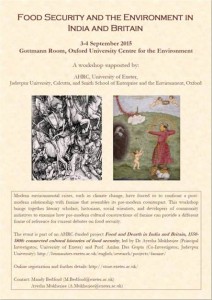Jayne Archer and Howard Thomas were invited participants in a meeting titled Food Security and the Environment in India and Britain: Historical and Cultural Perspectives, held on 3-4 September 2015 at Oxford University Centre for the Environment.
Here’s the abstract of the paper presented by Jayne at this meeting.
Food and the Literary Imagination
Howard Thomas, Jayne Elisabeth Archer and Richard Marggraf Turley
Although their terminology may have differed, former ages were acutely aware of the importance of food security. Incorporating land ownership and management; food purity and processing; the integrity of the food chain; and issues of distribution and pricing, food security has been at the century of public policy in England (later Britain and the UK). It has also been central to the English literary tradition, informing both the evolution of its language and metaphors and the development of genre and narrative. Despite this, it is often assumed that ‘elite’, canonical writers such as Chaucer, William Shakespeare, John Keats, Charles Dickens and George Eliot knew relatively little about the worked land and that their representations of plants, weeds and the environment are confected abstractions recycled from earlier writers.
Our paper draws on research presented in Food and the Literary Imagination (Palgrave Macmillan, 2014), a monograph co-authored by two literary historians (Richard Margraff Turley and Jayne Elisabeth Archer) and a plant scientist (Howard Thomas). Using a synthesis of literary-historical and scientific methodologies, and using selected literary examples including works by Shakespeare, Dickens and George Eliot, we argue that writers of the past have represented and responded to aspects of food security strikingly similar to those we face in the early-twenty-first century. In some cases, we will show, writers of the historical past anticipated recent scientific discoveries. Attending to food politics in the work of past writers is important, not simply for the experiential and traditional knowledge they record – knowledge we have neglected or forgotten – but because the arts, through which imaginative responses to the challenges we face can be addressed most powerfully, is a crucial component to any successful approach to food security in the present.

